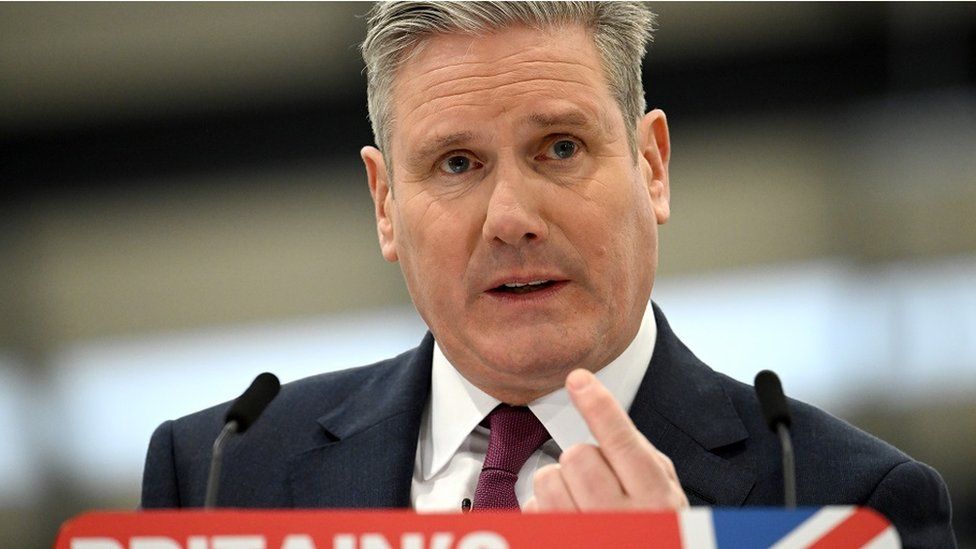ARTICLE AD BOX
 Image source, Getty Images
Image source, Getty Images
By Kate Whannel
Political reporter, BBC News
A Labour government would aim to increase defence spending to 2.5% of GDP "as soon as resources allow", Sir Keir Starmer has said.
The Labour leader also told the i newspaper he would conduct a strategic review of defence and security "to be clear what the priorities are".
Sir Keir's aim matches that of Chancellor Jeremy Hunt, who has also said he wants defence spending to rise to 2.5%.
It currently stands at 2.1% of GDP.
Earlier this year, two ministers - Anne-Marie Trevelyan and Tom Tugendhat - publicly urged the government to invest in defence at a "much greater pace".
In his spring Budget, Mr Hunt said the UK's armed forces were the "best funded in Europe" and that spending would rise to 2.5% "as soon as economic conditions allow".
In a statement ahead of a visit to Barrow-in-Furness in Cumbria on Friday - where nuclear submarines are made - Sir Keir said Labour's commitment to the UK having nuclear weapons was "total".
The UK's nuclear deterrent of four Vanguard submarines that carry Trident missiles armed with nuclear weapons is housed in the west of Scotland.
"In the face of rising global threats and growing Russian aggression, the UK's nuclear deterrent is the bedrock of Labour's plan to keep Britain safe," said Sir Keir.
"It will ensure vital protection for the UK and our NATO allies in the years ahead, as well as supporting thousands of high-paying jobs across the UK."
He also described his party as one that has "changed" - referring to his predecessor Jeremy Corbyn, a long-time opponent of the UK's Trident submarine-based missile system and vice-president of the Campaign for Nuclear Disarmament (CND).
Speaking to the i, Sir Keir said the nuclear deterrent was "expensive but it's absolutely vital and needed".
Annual running costs are estimated at 6% of the defence budget - about £3bn for 2023-24. The new Dreadnought boats being built at Barrow-in-Furness to replace the current submarines in the early 2030s carry an estimated cost of £31bn.
Image source, PA Media
Image caption,One of the UK's nuclear weapon-carrying submarines is always on patrol
Asked about defence spending, Sir Keir told the paper: "Obviously we want to get to 2.5% as soon as resources allow that to happen.
"That was the position when Labour left government and we absolutely stand by our commitment to Nato."
Defence Secretary Grant Shapps said the Labour leader and shadow defence secretary had "tried twice to put Jeremy Corbyn in charge of the nation's armed forces".
"The same man who wanted to scrap our nuclear deterrent, dismantle Nato and questioned the integrity of British intelligence community," Mr Shapps said.
"They are not the party to be trusted with our nation's defences."
SNP defence spokesperson Martin Docherty-Hughes MP - whose party does not support Trident - said Westminster had "already wasted billions of pounds of taxpayers' money on nuclear weapons".
He added it was "grotesque that Sir Keir Starmer is prepared to throw billions more down the drain when his party claim there is no money to improve our NHS, help families with the cost of living or to properly invest in our green energy future".
All members of military alliance Nato have pledged to spend at least 2% of the value of their economies - measured by GDP - on defence per year by 2024.
Nato estimates for 2023 suggest that Poland was the top spender, allocating 3.9% of GDP (the total value of goods produced and services), which was more than twice the amount it had spent in 2022.
The US was in second place at 3.5%, about the same level as it has been spending for the last decade.

 9 months ago
65
9 months ago
65








 English (US) ·
English (US) ·